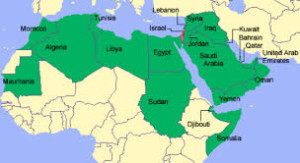Anyone who insists that it’s bad form to say, “I told you so,” has probably never had a real cause to say so.
Accordingly, I hope you’ll forgive me for juxtaposing news reports on the bloody turmoil now spiraling out of control in Egypt with my commentaries dating back to the germinating days of the Arab Spring, when I warned such turmoil would come.
 First, here is how Reuters reported on this existential conflict just yesterday:
First, here is how Reuters reported on this existential conflict just yesterday:
Egypt’s prime minister has proposed disbanding the Muslim Brotherhood of ousted President Mohamed Morsi, the government said on Saturday, raising the stakes in a bloody struggle between the state and Islamists for control of the country…
The interior ministry said 173 people died in clashes across Egypt on Friday, bringing the death toll from three days of carnage to almost 800…
The interior ministry said that 1,004 Muslim Brotherhood ‘elements’ had been arrested in the last 24 hours, accusing members of Morsi’s movement of committing acts of terrorism.
Now here is how I presaged all that is now unfolding over two years ago:
With all due respect to the protesters, the issue is not whether Mubarak will go, for he will. (The man is 82 and already looks half dead for Christ’s sake!) Rather, the issue is who will replace him. And it appears they have not given any thought whatsoever to this very critical question.
The devil Egyptians know might prove far preferable to the devil they don’t. Just ask the Iranians who got rid of the Mubarak-like Shah in 1979 only to end up with the Ayatollah — whose Islamic revolution they’ve regretted (and have longed to overturn) ever since….
(“Army Pledges No Force Against Protesters,” The iPINIONS Journal, February 1, 2011)
 As it turned out, it took little time for Morsi to prove himself a bigger devil than Mubarak:
As it turned out, it took little time for Morsi to prove himself a bigger devil than Mubarak:
Pro-democracy protesters were ruing the fact that those benefiting most from their blood, sweat and tears are members of the Muslim Brotherhood who, after winning control of parliament, seemed hell-bent on turning Egypt into an Islamic state … like Iran.
(“Military Coup After Just Five Months of Democracy,” The iPINIONS Journal, June 15, 2012)
Moreover:
It comes as no surprise to me that there are just as many pro-democracy protesters in Tahrir Square today as there were at the height of the protest movement against Mubarak almost two years ago.
Nor is the irony lost on me that, instead of a ‘benign’ dictator, they are protesting against a democratically elected president who fancies himself a latter-day pharaoh.
(“Egypt Redux: Morsi the Pharaoh…?” The iPINIONS Journal, December 5, 2012)
 And, with the Army now treating the Muslim Brotherhood and its supporters like al-Qaeda terrorists, it is not only making a mockery of its pledge of no force against protesters, but the country’s ruling military general, Abdel Fattah al-Sisi, now seems hell-bent on proving himself a bigger devil than Morsi. Not to mention the circular irony of al-Sisi, a former protégé of the deposed Mubarak, now presiding over a government that has Morsi under house arrest awaiting trial on charges that are eerily similar to those that had Mubarak serving a life sentence … until yesterday, when he was released from prison—ostensibly pursuant to ongoing criminal proceedings. Got that?
And, with the Army now treating the Muslim Brotherhood and its supporters like al-Qaeda terrorists, it is not only making a mockery of its pledge of no force against protesters, but the country’s ruling military general, Abdel Fattah al-Sisi, now seems hell-bent on proving himself a bigger devil than Morsi. Not to mention the circular irony of al-Sisi, a former protégé of the deposed Mubarak, now presiding over a government that has Morsi under house arrest awaiting trial on charges that are eerily similar to those that had Mubarak serving a life sentence … until yesterday, when he was released from prison—ostensibly pursuant to ongoing criminal proceedings. Got that?
And so it goes:
The only thing that will satisfy these protesters — who clearly have no ability to lead Egypt’s transition and have no faith in the ability of anyone else to do so — is replicating throughout the entire country the festive state of anarchy that reigns among them in Tahrir Square [i.e., never-ending revolution].
(“Egyptian Revolution Part II,” The iPINIONS Journal, July 14, 2011)
 Meanwhile, everyone is looking to the United States, the Egyptian Army’s purported enabling patron, to do something to restore order, if not democracy.
Meanwhile, everyone is looking to the United States, the Egyptian Army’s purported enabling patron, to do something to restore order, if not democracy.
Except that it was the United States that gave tacit approval to the Army to depose Morsi in the first place, which turned an already chaotic and admittedly untenable political situation into the bloody mess that is now unfolding:
I also find it curious that Obama is effectively calling on the Egyptian military to guarantee the protesters’ democratic aspirations. Ironically, he and other Western leaders seem to believe that the best way to transition from Mubarak’s dictatorship to democracy is by installing a de facto military dictatorship. The problem, however, is that in almost every case where this strategy has been deployed (e.g. in Pakistan and Burma), the military ended up overstaying its welcome … by years, if not decades.
(“Crisis in Egypt: the End Game,” The iPINIONS Journal, February 4, 2011)
 But Obama is feeling considerable heat to end this Faustian relationship, which U.S. presidents have maintained with other military dictators and autocratic monarchs throughout the Muslim world for over half a century. Here is an example of that heat – radiating from a joint statement Sen. John McCain, R-Ariz., and Sen. Lindsey Graham, R-S.C., issued on Friday:
But Obama is feeling considerable heat to end this Faustian relationship, which U.S. presidents have maintained with other military dictators and autocratic monarchs throughout the Muslim world for over half a century. Here is an example of that heat – radiating from a joint statement Sen. John McCain, R-Ariz., and Sen. Lindsey Graham, R-S.C., issued on Friday:
The massacre of civilians this week in Egypt has brought our longstanding relationship with that country to a fork in the road. The interim civilian government and security forces – backed up, unfortunately, by the military – are taking Egypt down a dark path, one that the United States cannot and should not travel with them.
We urge the Obama Administration to suspend U.S. assistance to Egypt.
(NBC News, August 17, 2013)
Except that, well, I warned about this too:
What is driving these tensions is that, just as the protesters clearly no longer fear military reprisals, the generals no longer fear U.S. reprisals…
In effect, they are now daring the United States to withdraw its $1.3 billion in annual military aid and risk losing what little influence it retains in this most powerful country in the Arab world. And the United States will cave because [it believes that] repairing this fractured relationship is even more in its geopolitical interest (to help defend Israel, defend the Suez Canal, and curtail the influence of radical Islam – especially in the Sinai) than it is in Egypt’s.
[Not to mention that] China and Russia are probably whispering in Egypt’s left ear that it would be more than happy to pick up the slack – without all of the self-righteous moralizing about democracy. Or that the Gulf States, led by Saudi Arabia, are already propping up the military with billions — no doubt fearful that a democratic revolution or an Islamist insurgency would threaten their idyllic governing monarchies.
(“‘Liberated’ Egypt Thumbing Nose at U.S.,” The iPINIONS Journal, February 7, 2012)
In other words, cutting off aid would seem a very consequential case of cutting off nose to spite face. Nevertheless, cutting off this aid is a categorical imperative. After all, if Eric Snowden’s NSA leaks have not already done so, the United States now risks forfeiting any chance of attaining moral authority, clarity, and consistency in its foreign policy if it continues funding the military’s ongoing slaughter and incarceration of so many innocent Egyptian people.
 In fact, I advised in my July 4 commentary, “A Democratic Military Coup…?,” that the United States should leave Egyptians to sort out their own mess, just as it is doing with Syria. Not least because the claim that it has to continue propping up military dictatorships and autocratic monarchies in the Middle East for Israel’s sake is belied by the fact that Israel has already demonstrated its ability to defend itself against all Arab states … combined.
In fact, I advised in my July 4 commentary, “A Democratic Military Coup…?,” that the United States should leave Egyptians to sort out their own mess, just as it is doing with Syria. Not least because the claim that it has to continue propping up military dictatorships and autocratic monarchies in the Middle East for Israel’s sake is belied by the fact that Israel has already demonstrated its ability to defend itself against all Arab states … combined.
Besides, cutting this hopelessly compromised aid would enable the Americans to rectify their patent charade of refusing to enter into formal military alliance with the Jews (“God’s chosen people”) to avoid offending the Arabs…. Especially given that former President George W. Bush has already let the cat out of the bag. Because, according to the February 2, 2006 edition of the Washington Post, when asked if the United States would come to Israel’s defense, Bush replied in his inimitably cocksure manner, “You bet, we’ll defend Israel.”
Then, of course, it would be the United States daring Egypt to retaliate by doing anything that directly threatens America’s strategic interests — like impeding passage of U.S. ships through the Suez Canal.
Finally, I’m on record providing this ominous, yet hopeful, outlook:
I’m afraid the only way these protesters will get rid of the military leaders who have always ruled Egypt is if there’s a split in the military like the one now developing in the Syrian military. This of course would portend civil war.
I am reminded though that it took nothing less than a civil war for the paragon of democracy, the United States, to find its way. I just hope the folks in Tahrir Square are prepared to die by the thousands for their cause.
(“Egypt: Military a Bigger Devil than Mubarak,” The iPINIONS Journal, November 22, 2011)
In the meantime, the ominous side of this outlook is clearly beginning to dawn on people on all sides of the motley factions struggling for control of Egypt today. Which explains why:
People want Mubarak-style security again.
(BBC, August 16, 2013)
Apropos of this, I wonder what has become of Wael Ghonim, the Egyptian Google executive who became so identified with the uprising against Mubarak (and who seemed to relish being touted as its de facto spokesman) that TIME named him one of the world’s most influential people in 2011…?
 In any event, there might be a silver lining in the dark clouds hovering over Egypt even for the immediate future. Specifically, the military’s propaganda is clearly aimed at deflecting blame for its atrocities by scapegoating al-Qaeda – complete with yesterday’s arrest of Mohammed Al-Zawahiri, the brother of al-Qaeda central’s (Egyptian) leader, Ayman Al-Zawahiri.
In any event, there might be a silver lining in the dark clouds hovering over Egypt even for the immediate future. Specifically, the military’s propaganda is clearly aimed at deflecting blame for its atrocities by scapegoating al-Qaeda – complete with yesterday’s arrest of Mohammed Al-Zawahiri, the brother of al-Qaeda central’s (Egyptian) leader, Ayman Al-Zawahiri.
But this might be sufficient provocation to goad al-Qaeda affiliates into retreating from places like the United States, Europe, and Africa to launch a reign of terror in places like Egypt and Saudi Arabia. Not least because Egypt is the birthplace of al-Qaeda’s fundamentalist jihad (thanks to Sayyid Qutb), and Saudi Arabia is an even bigger (financial) patron of the Egyptian military than the United States.
NOTE: Barring some seminal event, which even I cannot foresee at this point, I shall have no further comment on the inferno and purgatory that will define life in Egypt until they arrive at their paradise on earth, namely, a democratically elected government that all warring factions can live with….
Related commentaries:
Army pledges no force…
Military coup…
Egypt redux…
Egypt revolution II…
Crisis in Egypt…
Liberated Egypt…
Military savior…
* This commentary was originally published yesterday, Sunday, at 8:53 am